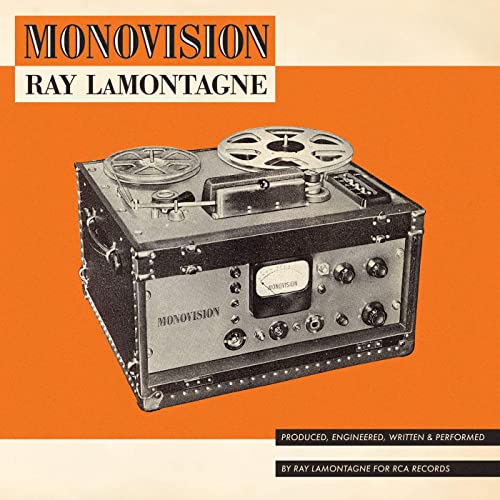Throughout this COVID-19 pandemic period we are all living through collectively, we have each found new ways of working. This has been out of necessity more than anything else. Although this new release from Ray LaMontagne was recorded pre-Covid, it resonates as a work recorded alone and in isolation. It’s a beautiful collection of songs and one that can soothe the soul as we are all spending more time alone.
Introspective Reflections of a Folk Singer Baring His Soul
The singer-songwriter delivers emotionally captivating folk-rock balladry that soothes in its candor, soul, and simplicity. After pushing his musical boundaries a bit with the experimentalism of 2014’s “Supernova” and 2016’s “Ouroboros,” for this, his eighth album, LaMontagne returns to familiar territory. The album has all of the Ray LaMontagne trademarks, consisting mostly of love ballads shared via gently strummed minor chords, soft, crooning vocals, and a soft, tender atmosphere. But what the album lacks in surprises it makes up for in authenticity, “Monovision” consisting of the introspective reflections of a folk singer baring his soul.

Album-opener “Roll Me Mama, Roll Me” is a finger-picked love ballad that excels due to LaMontagne’s impassioned vocal delivery in the chorus. As the song transitions from verse to chorus, LaMontagne’s voice shifts from light and gentle to a strong, grainy rasp. “Roll me mama, roll me like only you can,” he sings, the pain heard in his throaty delivery, adding a sense of desperation. “Strong Enough” is the album’s most upbeat track and one of its finest, built upon an infectious folksy groove and LaMontagne’s deceptively powerful voice at its most unrestrained. “I’ve been told there’s gold in this land; all I know is what I hold in my own two hands,” LaMontagne sings.
Aside from self-producing and engineering “Monovision,” LaMontagne plays all of the instruments, giving him extensive control over his music. The result is a throwback album that sounds a bit like 2004’s “Trouble,” though its timeless sound would fit virtually anywhere in America’s roots.
“At this point, I just trust my own voice”
There is a soulful immersion at the root of LaMontagne’s music. His husky voice and whispered delivery carries a weariness, a hint of a lifetime of pain and struggle behind the pleasant love declarations. Most of “Monovision” is soft and slow, the music thriving on its nuances. At times, though, LaMontagne cuts loose from those subtleties and delivers some of the album’s best moments.
“Monovision” once again luxuriates in the ’70s singer-songwriter settings that were backgrounded somewhat in LaMontagne’s previous few albums. “At this point, and it’s really been like this since (2014’s) ‘Supernova,’ I just trust my own voice,” he says. “I don’t think about it anymore. When you’re young and you’re listening to records non-stop, that’s how you learn. I mean, that’s how I learned. That’s how I learned how to play any instrument at all. I learned how to sing by listening to the ones that I thought were the great singers and the songwriters that spoke to me.”
A Song Written and Recorded Before Breakfast
LaMontagne found that his DIY approach led to some pleasant surprises, like on the lovely track “Weeping Willow,” featuring him in multitracked harmony like a one-man Everly Brothers. “It happened really fast,” he says of the track. “It happened before breakfast. I walked through the studio with a cup of coffee and the melody jumped into my head. It was written and recorded by about 10:30 in the morning. That was the beauty of it, once I was on a roll in getting my hands on everything and having things set up. That’s never happened before. I’ve never been able to do that. That was just one of those little gifts of this process. Being able to get a song and get it down that fast. Before you’ve had breakfast, you have a track on the record that you’re happy with.”
Songs “Summer Clouds,” “Misty Morning Rain (Here and Gone Again)” and “Morning Comes Wearing Diamonds” lend human qualities to heavenly bodies. “I live here [in Massachusetts] on the farm, or my wife and I have a little place out on an island in Maine that we visit,” LaMontagne says about his affinity for the natural world. “It’s just that’s where I find peace. It’s just being quiet and being in nature. It’s just such a gift to be alive, such a gift to be present. To be able to be a part of it. And I don’t want to waste it. I don’t want to miss it.”
A Solo Work in the Truest Sense of the Term
A solo work in the truest sense of the term, LaMontagne played all the instruments, wrote all the tunes and even engineered and produced the 10-song collection. While LaMontagne, a New Hampshire-born Massachusetts resident, has usually expanded his sounds from album to album such as adding strings, for example, or leaning into psychedelia, here he takes a few steps back and the outcome is stunningly refreshing. A roster of key influences also found on earlier albums, like Van Morrison or Neil Young, are also evident here, but now they’re channeled more directly than before thanks to the unfussy arrangements and a deep-and-wide mix.
Two of the best tracks are “We’ll Make It Through” and “Highway to the Sun,” the last songs on each side of the vinyl release. “Where do you turn when this living starts to burn through layers that you learned to wrap around your heart somehow?” LaMontagne asks on the relaxed, comforting ballad “We’ll Make It Through.” This song wraps its confidence about a relationship in a poignant melody with a fluttering harmonica, while “Highway to the Sun” is languid and bittersweet — “Just want to feel something real before I die” — while leaving a door open to the possibility that the wish may yet come true. As LaMontagne attempts to reassure, his soft vocals and gentle composition invite the listener to lean in as if to hear a secret.
“Monovision” Feels Like a Career High
Regardless of how it’s contextualized in terms of his other work, “Monovision” feels like a career high. Its overarching message of finding comfort and reassurance in the simpler things and in loved ones couldn’t be timelier, and it’s a message that LaMontagne hopes will find its audience. “That’s the power of music,” he says. “That’s why I listen to music. That’s why I still listen to records made 30, 40 years before I was even born. They speak to me. I hope these songs find their way into people’s lives. That’s all you can do.”
LaMontagne has filled “Monovision” with warmth and pure emotions on songs that, even without all the bells and whistles, will ring true in ears and hearts.





